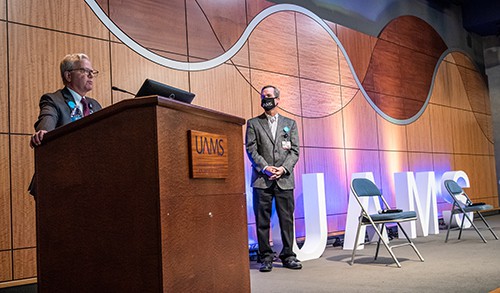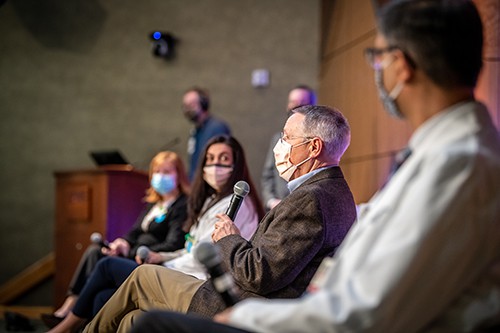Expert Panel Answers COVID-19 Questions at Chancellor’s Town Hall
| That the health benefits of being vaccinated against COVID-19 far outweigh the grave risks of the disease or any potential vaccine side effects was the consensus of a UAMS College of Medicine panel of experts Jan. 22 during the chancellor’s monthly Town Hall.
UAMS Chancellor and UAMS Health CEO Cam Patterson, M.D., MBA, said while UAMS is doing well in vaccinations, it needs to do even better. Vaccination against COVID-19 isn’t mandatory, but it is strongly recommended.
“We all think it’s the wise thing to do,” Patterson said. “As we learn more about the vaccine, our policies for COVID-19 vaccination might evolve. It may be that we would not have people unvaccinated serving in certain functions at the university, but we’re not there yet.”
Steppe Mette, M.D, senior vice chancellor of UAMS Health and UAMS Medical Center CEO, said UAMS has administered more than 11,000 vaccinations to its work force.

UAMS Medical Center CEO Steppe Mette, left, presents an overview of the vaccination effort at UAMS as Chancellor Patterson, right, and a mostly virtual audience listen.Image by Bryan Clifton
Christina Clark, MBA, UAMS chief operating officer, gave a brief tour of an electronic dashboard display of data about vaccinations that allow leadership and clinicians the ability to see how vaccinations efforts are faring each day.
About 7,300 employees have received the first of two vaccine doses, and about 3,400 have received their second dose.
“We have been conservative to make sure we have enough vaccine so we will never give out more doses of the vaccine than we have in reserve to allow for the revaccination of our employees, and in about two weeks, our patients,” said Michelle Krause, M.D., M.P.H., professor in the Division of Nephrology.
Krause was one of four physicians on the panel that also included, Robert Hopkins, M.D., professor and division director of General Internal Medicine and chair of the National Vaccine Advisory Committee to the U.S. Department of Health & Human Services; Nirvana Manning, M.D., chair of Obstetrics & Gynecology; and Keyur Vyas, M.D., associate professor, Internal Medicine Division of Infectious Disease.
In response to a question about possible long-term effects from the vaccine, Vyas said, “What I do know is the likelihood of getting COVID-19 now in Arkansas, or even the United States, is very high right now. The long-term effects of COVID are disastrous, and the risks of it from the vaccine are quite low, even accounting for the unknowns. You are more likely to protect yourself and family with the vaccine.”
Patterson shared his opinion and provided some historical perspective.
“While the COVID-19 vaccine is new, this type of vaccine has been around for years,” the chancellor said. “Side effects from vaccines typically last one day or less after vaccination rather than months or years.”
Hopkins said little difference exists between the effectiveness of the Pfizer vaccine and the Moderna vaccine, the two vaccines available in the United States at the present time. He recommended against getting other vaccinations at the same time as one for COVID-19.“We have advice from the Center for Disease Control and Prevention (CDC) that there should be at least a two-week gap before getting another vaccine for another disease,” Hopkins said. “We are using a new vaccine to prevent COVID-19. If anyone has any kind of reaction, we want to be able to tell if it is being caused by the coronavirus vaccine or a different vaccine. We don’t yet have enough data about giving the COVID-19 vaccine along with other vaccines for other diseases.”
Vyas answered a similar question about the 90-day wait between recovery from COVID-19 and being vaccinated against it.
“There is evidence people will not get re-infected within 90 days of testing positive because they have some natural immunity protecting against it,” he said. “They also may be more reactive to the vaccine, too, in terms of side effects.”

Robert Hopkins, second from right, answers a question during the panel discussion at the Chancellor’s Town Hall.Image by Bryan Clifton
Manning spoke to questions regarding pregnancy, breastfeeding and vaccination for COVID-19. The biggest concern obstetricians like herself have is an expectant mother’s immune response to the vaccine during the first trimester of pregnancy, she said. That response can include fever, chills and body ache.
Although there is an increased risk of miscarriage or a baby having birth defects with a fever or other immune responses during that time, Manning said, “You also will have a high likelihood of an immune response and symptoms from the disease itself. It deserves a conversation with your health care provider about your particular risks and benefits from the vaccine in the first trimester.”
Mette said the number of COVID-19 patients hospitalized in the medical center has been relatively stable in the last two weeks, along with fewer patients on ventilators and other life support. The university is also at a six-week low for the number of quarantined employees.
“We have adequate supplies, medications and resources,” Mette said. “We have a surge plan in place that is operational currently to expand critical care beds and med-surge beds if needed.”
The medical center has expanded its total number of critical care beds from 52 to 82 but has used only about 12 of the 30 new beds so far and is prepared for double occupancy on two floors should that be needed.
Before the panel discussion, Brian Gittens, Ed.D., MPA, said he had little to say at the Town Hall that couldn’t be said by the “illustrious” experts there.
“I decided I would offer some perspective – the perspective of being a UAMS team member, of being a person of color and of being a father.”
He briefly recounted historic examples of disparities in the quality of health care provided to people of color. He said those disparities, racial biases in health care systems and misinformation have diminished trust that minority communities have in providers.
Gittens said he knows the way COVID-19 had disproportionately affected people has highlighted historic health disparities even further.
“I also know that 400,000 people have died from this disease,” Gittens said. “We can get numb to numbers like that, but we need to remember each one of those numbers behind that total is someone’s father, mother, daughter, son or someone’s loved one.”
He said he would do anything to keep his loved ones safe.
“This vaccine gives us the opportunity to do just that,” Gittens said. “To me, the message is clear. Protect yourself and those you love and those who love you: Get the shot.”
Patterson thanked him for his insights and later thanked the panel as well.
“We appreciate you sharing your expertise with Team UAMS,” the chancellor said. “For those of you who joined in, I hope you will share what you have learned with your team members, your family and your friends. This is a team effort for each of us to get to the point where the vaccine will diminish the prevalence of the virus in our communities.”
More than 800 Team UAMS members joined the Town Hall that was streamed live on Zoom from the Fred W. Smith Auditorium on the main UAMS campus.
